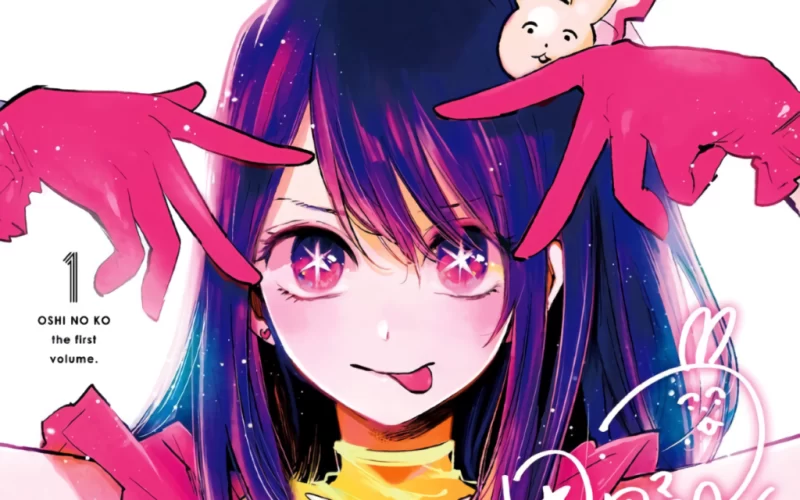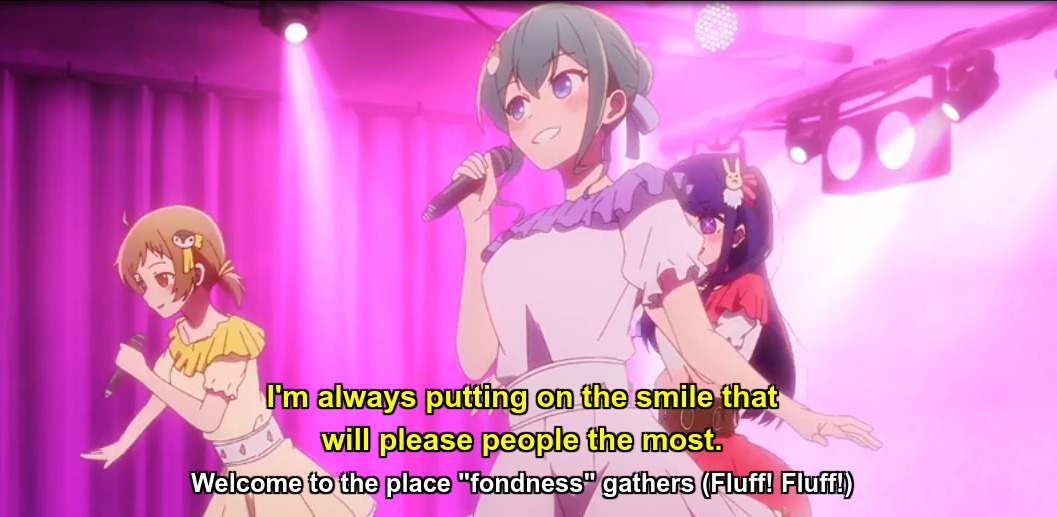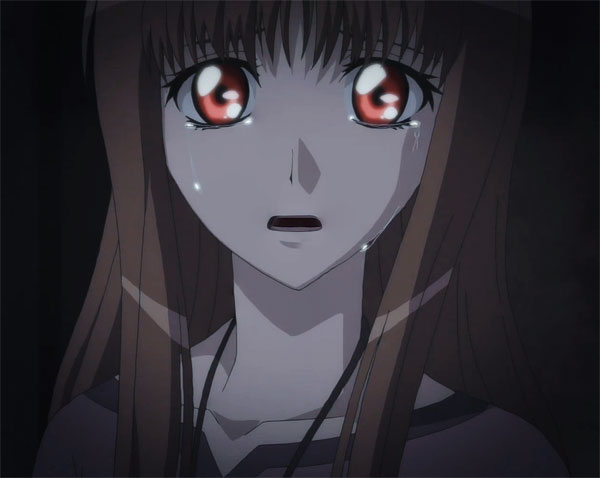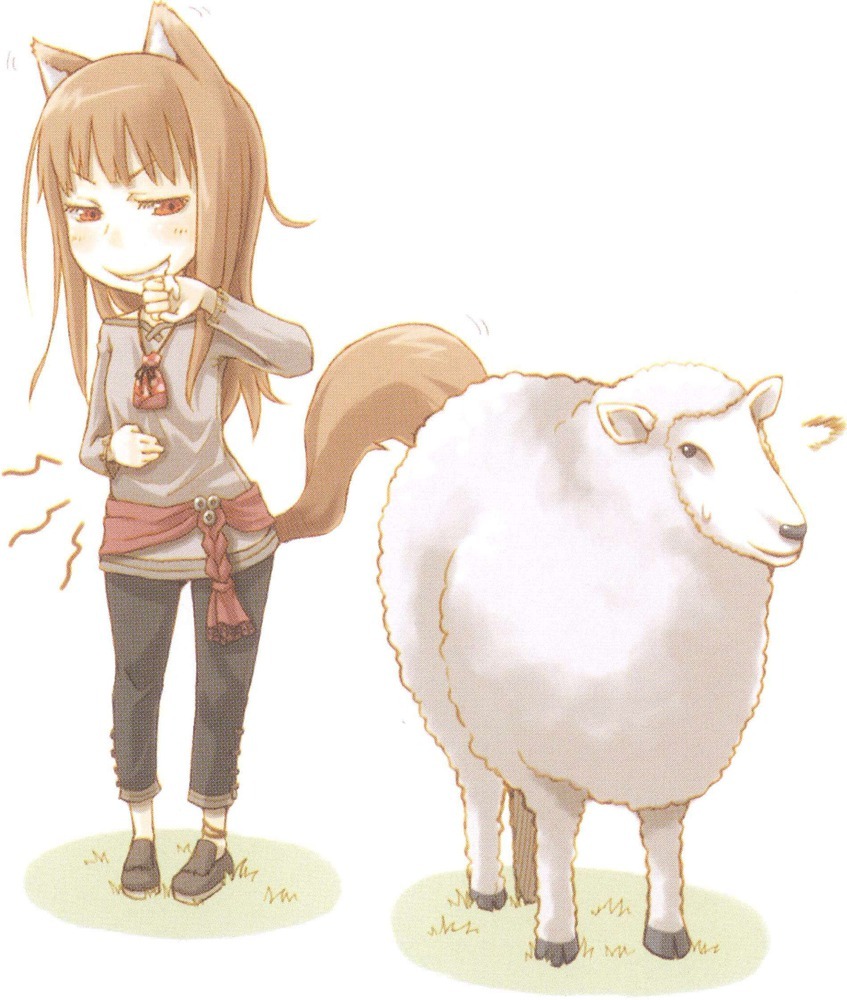Where do the lies end and the truth begins? This theme unifies the first season of Oshi no Ko. The story stares into the dark side of entertainment industry, deep into the abyss of pop idols, acting, and online personalities. Oshi no Ko‘s beautiful and bright artwork contrasts against the story’s dark story. This article will spoil season 1 of the anime.
Death, Rebirth, and Fandom
The story begins with Ai Hoshino, a famous pop idol who overshadows the entirety of the story through her tragic absence. She takes a hiatus from her career and goes into hiding in a rural area. She’s pregnant at 15. With twins. Japanese pop idols are not supposed to date, let alone get knocked up. Part of their allure, beyond their youth and looks, is the fantasy of a fan dating her. Pop idols sing of love, after all. Her obstetrician-gynecologist Gorou happens to be a huge fan of Ai. When Ai goes into labor, an obsessive fan murders him on his way back to the hospital. When Gorou awakens, he discovers he had been reborn as Ai’s son, Aquamarine. He retains his memories from his previous life. His twin sister, Ruby, is the reincarnation of his patient, Sarina, who was also a fan of Ai and had died from illness some time before. Over the course of the anime’s first episode, which runs for around an hour and a half, we get to know Ai. She had grown up in a children’s home before being scouted to become a pop idol. Because she had never had a family, she became pregnant in the hopes of finding love and family through a child. However, because she had worn a mask of lies for so long, singing about love she had never felt, she feared she didn’t love her twins. When the fan who murdered Gorou stabs Ai in a fit of entitled rage, Ai’s final act is to tell her twins that she loves them. She had never spoken the words because she feared that they would be a lie, but as she let out a final, relieved breath, she realizes she spoke the truth for the first and final time.
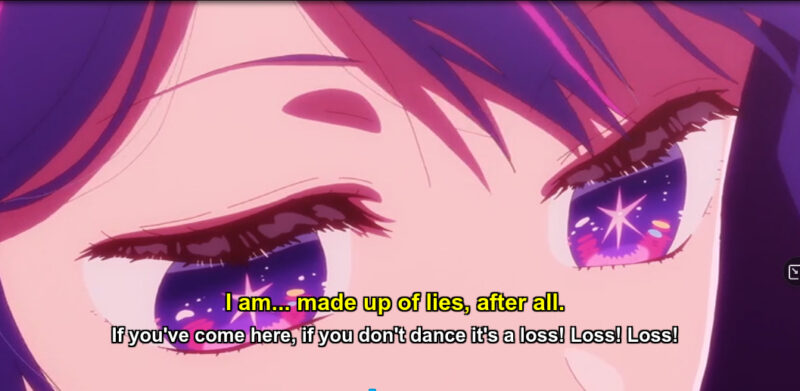
And so Ai dies with Aqua trying in vain to stop her bleeding with his body and with Ruby on the other side of the glass door. I wrote about this death scene at length. It remains one of the hardest and most touching deaths scenes I had seen in fiction. Ai. as any good dying mother would, wishes the best for her children, stating she could see Aqua becoming an actor and Ruby becoming an idol.
In the aftermath of her death, the Internet buzzed with speculation and hurtful trolling. Oshi no Ko captures the ugly tribalism that is the Internet. Aqua and Ruby, both able to talk and think beyond their toddler years, are devastated by the murder of their mother and idol. As Ruby enters the online flame wars, Aqua deduces there was only one way Ai’s murderer could’ve found their home. Ai had only one connection outside the talent agency: their unknown father. Aqua vows to discover his father’s identity and make him suffer as Ai had.
Fast forward to high school. Aqua and Ruby had been adopted by Miyako and Ichigo Saito, the couple that runs Strawberry Productions, the talent agency that had recruited Ai. Aqua and Ruby enter a high school dedicated to entertainment talent. Aqua had continued to work as a production assistant for the director that had given him childhood acting jobs. Aqua wants to remain in the background while he searched for his father; however, when he encounters Kana Arima again (they had met as child actors) he decides acting would give him a better chance at revenge. His sister continues to aim toward becoming an idol. Aqua does whatever he can, at first, to prevent this, even calling her to fake an audition rejection. This changes once Strawberry Productions revives Ai’s old idol group. Aqua then does what he can to support Ruby’s beginning idol career while still protecting her.
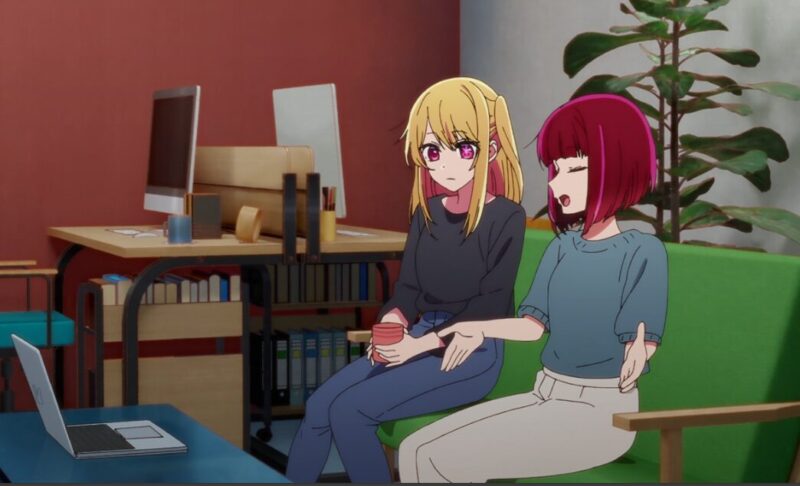
Kana asks Aqua to join her on a budget online production as a villain. He finally accepts, and his acting skill allows Kana’s skill to finally show through. In the process, Kana begins to fall in love with Aqua. Aqua convinces her to join the newly revived B-Komachi idol group and to look after his sister. To help his acting career take off, Aqua joins a reality TV dating show, LoveNow, much to Kana’s consternation and Ruby’s discomfort as a sister. Over the course of the show, Aqua makes a connection with the stage actress Akane. Akane begins as an overlooked character on the show until in an outburst she accidentally scratches the face of the popular cast member. The Internet immediately and mercilessly roasts her. The death threats, trolling, and flaming devastates her. Aqua rescues her from a suicide attempt. Aqua and the rest of the cast create an Internet video and posting campaign designed to silence most of the roasting and to help restore her confidence. With the encouragement of the dating show’s female cast, she decides to pursue Aqua to garner more attention from viewers. After Aqua reveals his love for Ai, Akane studies Ai and imitates her. The accuracy of this imitation disturbs Aqua and convinces him that Akane may prove useful with understanding his mother. Akane offers a valuable tool for his revenge. So, they become a couple at the end of the show, which troubles Kana. Aqua has no interest in Akane outside of her usefulness. Akane, like Kana, genuinely falls in love with him.
The first season ends with B-Komachi’s first concert. The group expands to include Mem-cho, an Internet influencer Aqua had met on LoveNow. Mem-cho, like all the characters, has her own lies. She lies about her age, claiming to be a high schooler (because they are popular) when she’s a mid-2os high-school drop out. Aqua learns that Ai had changed when she had entered into an acting program, the same program Akane is from. When an acting role with Akane and Kana is offered to him, the role has links with that acting program, Aqua agrees.
Words Cut Deep
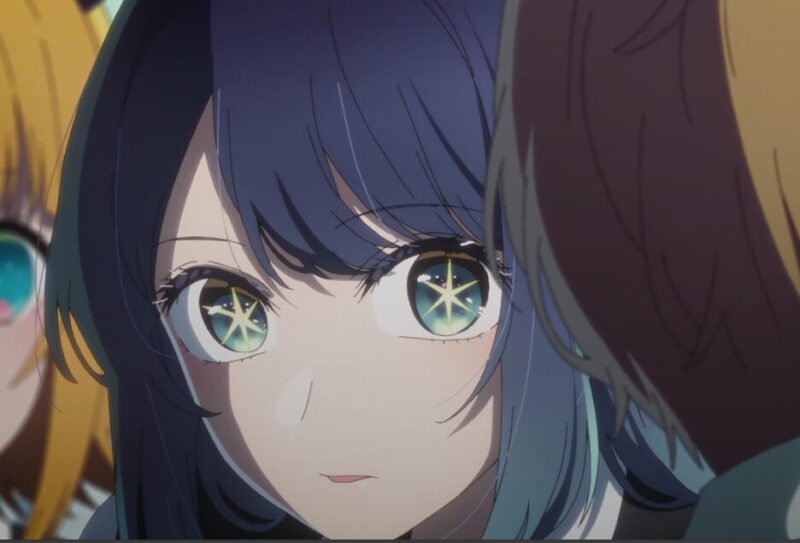
Oshi no Ko develops along two-to-three episode story arcs unified by the central theme of lies. The first episode spans the run-time of three normal-length episodes and centers on Ai. Akane’s spiral into suicidal ideation follows the same span. Ego surfing, looking at what people are saying about you, peppers the story up until Akane’s arc. Akane’s ego surfing crushes her self-confidence and her sense of value as a person after the dating show’s scratching incident. As the characters stated, for a normal teen girl, the situation would’ve resolved fairly quickly with minimum online flaming. But as a public personality, Akane’s accident would continue to be brought up decades later. It would never disappear. Akane keeps silent about how much she’s suffering. She doesn’t want to trouble her mother, who doesn’t understand social media, and she wants to be professional. After all, professionals should be able to deal with the criticism and Internet nonsense. It comes with the job. But as Aqua notes from his reincarnated older-adult perspective, Akane is just a 17-year-old girl with all the insecurities that come with that. She can’t be expected to weather the barbs of hundreds and thousands of online trolls. And so, she tries to escape the pain by killing herself. Aqua’s rescue and the support of her fellow cast members who genuinely like her helps her recover.
The arc points to how words hurt. Text on a screen cuts deeper than knives. They slice at your soul, your sense of who you are, and your worth as a living being. People tear others down without a sense of the true damage they cause. Public figures make convenient targets. After all, they are insulated from suffering by their wealth and success! It’s punching up. But as Akane shows, there’s a person behind the acting. Virtual punches connect with flesh. The pressure to perform and the placate the trolls squeezes. The desire to have someone, anyone, acknowledge your worth and your work, can smash you.
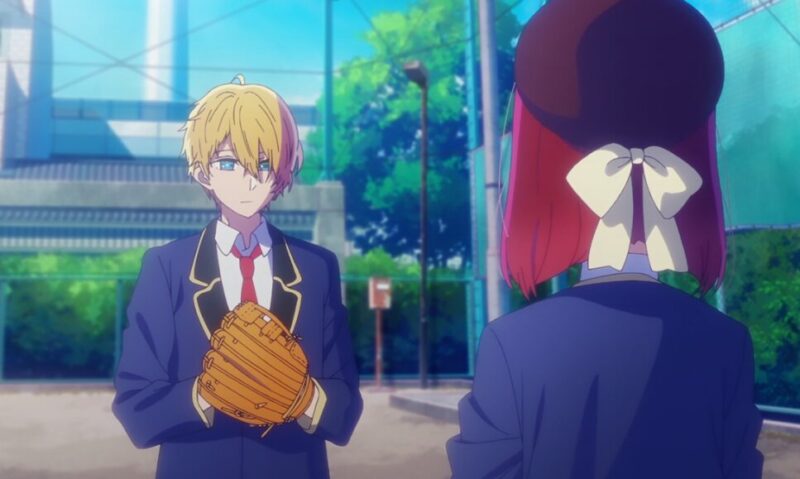
Oshi no Ko doesn’t address the true solution to this problem: learning to look within and not without for validation. Aqua’s behavior points to this. He’s driven by his internal locus of control and his goal: revenge. While not the most savory drive, he isn’t externally validated as Akane, Kana, and the others are. This makes him stand out. Most people are externally motivated; it’s natural to want to be acknowledged and the belong. But this leave us open to exploitation. Even after Akane recovers, she begins to act like Ai to win Aqua’s attention. Again, an externality. Oshi no Ko illustrates this need, particularly among teens, well. It’s silence on the true solution and the difficulty of reaching that solution can be taken as a message on its own. In the world of entertainment, there’s no place for internal validation. You are judged by how well you lie. You are protected by how well you lie. Honesty leaves you open to be cut by words and lies, yet protecting yourself by lying cuts at your soul too. Ai feared how her own words would cut at her because of how they were nothing more than lies she told fans. She wanted to convince herself that the lies were truth. Only as she dies does the lie become truth, or perhaps the lie finally falls away. Words matter. By protecting yourself with lies, you harm yourself.
On-the-Nose Exposition
Oshi no Ko suffers from moments of exposition. It’s not a bad thing for the story, but at times, it felt as if the characters were speaking to the audience. They explain the inner workings and problems of the idol industry and acting industry. It’s unavoidable because few are privy to these inner workings. In order to understand the impact of this environment on the characters, exposition becomes necessary for the health of the character plots. Spice and Wolf suffers from the same problem. Exposition is forgivable in both of these stories because of how the plot and character arcs hook into it. Spice and Wolf handles this a little better than Oshi no Ko because Spice couches its exposition with banter. Oshi no Ko doesn’t do this as well, and this hiccup is noticeable as you watch. But it is forgivable. There’s no other way to handle this. Sometimes, however, the commentary reiterates what’s implied in a previous scene. I prefer implications, but as I’ve learned over the years, many people need this on-the-nose commentary to make implied points clear. Explaining what’s implied doesn’t really undermine anything, but it does point to a lack of audience sophistication. Akane’s online flaming gets a lot of this on-the-nose explaining even though the implicit parts are clear.
Absent Presence and Lies
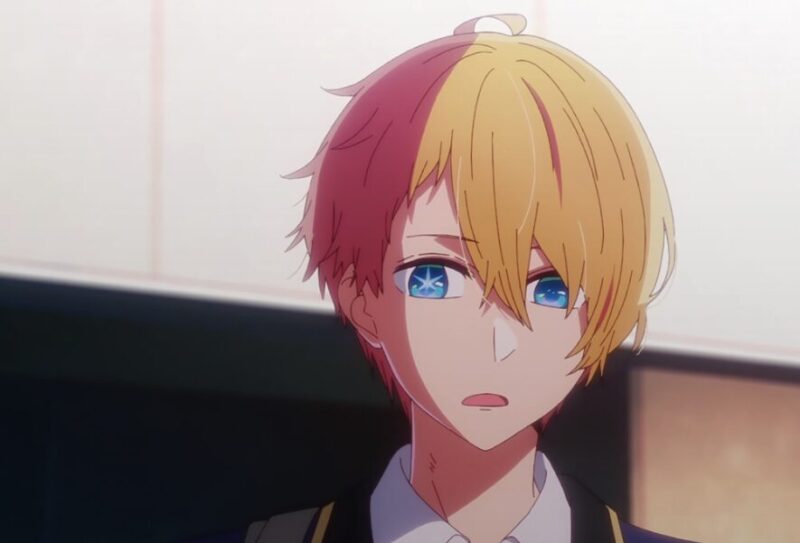
Ai remains a constant presence throughout the story. She is, perhaps, one of the most influential absent character in anime. Her shadow and lies tint the entire first season. In many regards, her murder made her even more famous, just as premature deaths do in reality. She also remains a mystery. In the first episode, we get to know her a bit, and how she can’t tease her own lies and self. No one, not even her own children, understood her. Behind her starry eyes sits an isolated soul that’s more implied than drawn. When Akane imitates Ai in an effort to appeal to Aqua, the story points to how Ai’s very personality could be an imitation. After all, Ai and Akane attend the same theatrical program. Akane nails Ai’s persona to the smallest detail, and in the first episode, Ai speaks about how she refines her smile by the millimeter and tweaks her persona. Ai loses herself in that persona.
Ai represents the story’s focus on the boundary between lies and truth. Aqua and Ruby lie about their reincarnations and their goals. Aqua layers the lies over himself until he starts to lose his sense of self as Ai had. The story implies that his gloomy side is the same as Ai’s true identity. As Aqua states, lies provide one of the few means of protecting your true self from the cutting nature of the entertainment industry and of fans. The entertainment they perform is a lie too. Idols sing of love and sell themselves as girlfriends for lonely fans. Reality dating shows like LoveNow are little more than a contrivance. While at the end of the dating show, Yuki, one of the girls in the show, rejects the guy Nobuyuki, they end up dating in reality. The lie protects their relationship. Minor details like this unify the story under its theme. This detail ties back to Ai’s relationship lies.
Lies with a View
Although Aqua is framed as the point-of-view character, we spend only a little more time in his head than we do in Ruby’s head during the first season. A good section of the story shows through Kana’s view and from Akane’s view. The audience sees Aqua’s thoughts before shifting to a different point of view. It’s an interesting approach which keeps the story’s pace rapid.
Oshi no Ko teems with production value and offers a surprising number of layers if you look for them. It offers a perspective on entertainment and the costs of fame while skewering the way people behave on the Internet. It’s social commentary hammers the nail and points to how we need to be better. The story implies how lies, although a necessary protection in the frame of the sketched world, eventually extract their cost. Lies, when layered too deep, distort humanity.
